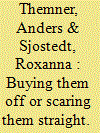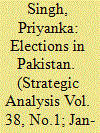| Srl | Item |
| 1 |
ID:
171219


|
|
|
|
|
| Summary/Abstract |
Post–civil war democracies are characterized by intense electoral competition. To ensure continued political relevance, ex-military-turned-politicians, or “warlord democrats” (WDs), can either engage in a rhetoric of fear or ease societal tensions by employing a rhetoric of peace. WDs’ choice of rhetoric can have a profound impact on durable peace by altering societal discourses concerning the legitimacy of using violence. A key question is therefore: Why do some WDs employ a rhetoric of fear, and others a rhetoric of peace, when running for office? We argue that the choice of rhetoric is a function of the patrimonial endowments WDs possess; if WDs lack the resources and social networks needed to distribute patronage, they may instead use a rhetoric of fear to rally voters. To highlight the explanatory value of this proposition, we compare two Liberian WDs who ran for the Senate in 2005—Adolphus Dolo and Prince Johnson.
|
|
|
|
|
|
|
|
|
|
|
|
|
|
|
|
| 2 |
ID:
127464


|
|
|
|
|
| Publication |
2014.
|
| Summary/Abstract |
In the run-up to the May 2013 elections, the political scene in Pakistan was absorbed in electoral rhetoric, active campaigning and a hectic poll process. It culminated with an expected set of results-the Pakistan Muslim League-Nawaz (PML-N) emerged victorious and took the reins of power after a decade and a half. The incumbent Pakistan People's Party (PPP) was nearly decimated and Imran Khan's Pakistan Tehreek-e-Insaf (PTI) marginalised. Meanwhile, during the entire electoral process and the eventual change of guard, Pakistan-occupied Kashmir (PoK), that is, the so-called Azad Jammu and Kashmir (AJK) and Gilgit Baltistan, remained on the political periphery, even though they have been under Pakistan's control for more than 65 years. Deprived of a provincial status, neither region within PoK is entitled to participate in the national assembly elections of Pakistan. The only representation PoK has in the federal government is through the Ministry of Kashmir Affairs and Gilgit Baltistan (KAGB).
|
|
|
|
|
|
|
|
|
|
|
|
|
|
|
|